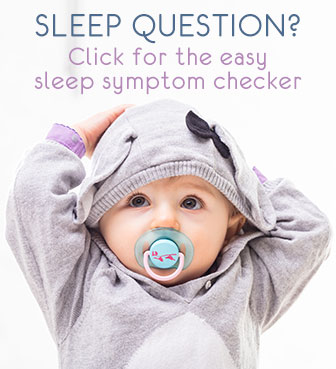Baby sleep expectations: How realistic are they?
by Tessa Marks
When we’re expecting, many of us have ideas, fantasies, and baby sleep expectations with long peaceful nights for our little one in their beautifully prepared crib as the top one.

These fantasies rarely become a reality. Babies wake up many times and, depending on the baby, they can keep doing this for a long time.
The unrealistic baby sleep expectations are reinforced by doctors and other health care providers as well as the people around us asking if our 2-month-old baby is already ‘sleeping through the night?’.
When our baby’s sleep doesn’t meet these social expectations, we begin to wonder if our baby has a ‘sleep issue’ that must be fixed and leads to a struggle between the pursuit of a ‘decent night’s sleep’ and the baby’s actual need for contact, comfort, and regular night-time feeds.
For this blog, I explore the 2021 research paper by Rudzik & Ball. This research looks at the influence of our Western cultural perspective and biased research methods on our ideas of ‘normal baby sleep’.
What are baby sleep recommendations and expectations based on?
First, the research paper shows us the methods used to determine classic sleep recommendations were often biased. They were conducted with a group of white babies who were formula-fed, slept in a room alone and were put to sleep on their bellies. Safe to say that this is not a representative group.
Current research shows that sleep needs are hugely variable between babies. It’s only at 12 months of age some consistency between babies in sleep duration begins to appear. However, there are persistent differences in sleep duration until 4–5 years of age. How long a baby will typically sleep and need to sleep is still very individual and can vary a lot between babies of similar ages.
As a result, the sleep charts and public health recommendations of how much sleep babies ‘should’ get and how they should sleep at any given age might not always be in line with their individual needs.
What are our baby’s biological needs?

Human babies are much less mature than any other animal at birth. The caregiver, therefore, needs to keep the baby close by and fed until the baby becomes more autonomous.
It’s in the biology of babies to wake to feed regularly during the night throughout the first year of life because of the energetic needs of rapid brain growth.
Babies will also spend a large proportion of sleep time in active (REM-like) sleep and less time in deep sleep. This will change over time. As babies are born with no circadian clock, it takes several months for a day-night rhythm to become established.
In sum, biologically normal baby sleep involves frequent night waking for feeding and interaction with a mother who sleeps close to her baby.
So, how were our current cultural beliefs about baby sleep shaped?
Expectations of infant sleep in most Western societies differ greatly from the biological view of ‘normal infant sleep’. In most cultures, babies are carried during the day and sleep near a parent or carer at night. Our dominant models of infant care in Western settings emphasize the importance of separation and minimizing bodily contact, particularly at night.
Was this difference between these western and ‘other’ parts of the world always there?
The answer is no! The Western cultural perspective changed since the mid 19th century, and it is important to understand how and why. Industrialization meant much longer workdays and the need for sufficient sleep during the nighttime period became vital. It was further reinforced by the early 20th-century era of ‘scientific baby-care’.
This led to beliefs such as ‘crying is good for babies’ and ‘babies will be spoiled when picked up’ or will be ‘clingy’ if allowed access to their parents at night etc.
They were shaped by cultural and political beliefs emphasizing early independence, self-control, and self-reliance and not by the babies’ biological needs.
So, even though these beliefs became embedded within our cultural beliefs and practices, they are not in line with the biology of baby sleep and their needs.
How do these unrealistic expectations affect us as parents?

Prolonged lack of sleep in the early months of your baby’s life may have negative consequences for parental health and wellbeing. This can become worse if, in the transition to parenthood, expectations fail to match reality. As a result, this clash between culturally aligned family sleep expectations and the biological needs of human babies can cause a great deal of anxiety and stress for the parents. As a result, they can:
- threaten parental resilience
- compromise family well-being
The good news is that biological and evolutionary views on infant sleep norms have (re)entered the discourse over the past 20 years and are starting to resonate more and more with both parents and health practitioners. In this approach, recommendations and guidance for parents are based on human infant physiology and evolutionary baby sleep expectations, rather than cultural norms that have changed so much in the last two centuries.
The most important messages we want to give you are:
Having a baby that wakes up frequently during the night is in fact the behaviour of a normal baby. However, we do live in a culture where the demands of daily life mean we need to get enough sleep in order to function.
This is what we can help you with here at Baby Sleep Advice. Together we find ways to optimize you and your baby’s sleep while staying as close to your baby’s biological needs as possible. We value Heidi's truly-no-tears approach while making changes that best support your baby and family.
Take a look at Heidi’s award-winning sleep program and determine which path is right for you, or enquire about 1:1 consultation.
References:
Ball, H. L. (2008). Evolutionary paediatrics: A case study in applying Darwinian medicine. In S. Elton & P. O’Higgins (Eds.), Medicine and evolution: Current applications, future prospects (pp. 125–150). Taylor & Francis. Retrieved from http://dro.dur.ac.uk/4073
Ball, H. L. (2013). Supporting parents who are worried about their newborn’s sleep. BMJ, 346(apr15 4), f2344–f2344.
Ball, H. L. (2017). Evolution-informed maternal–infant health. Nature Ecology & Evolution, 1(3), 0073
Ball, H. L., & Russell, C. K. (2012). Night-time nurturing: An evolutionary perspective on breastfeeding and sleep. In D. Narvaez, J. Panksepp, A. Schore, & T. Gleason (Eds.), Evolution, early experience and human development: From research to practice and policy (pp. 241–261).
Barry, E. S. (2020). What is “normal” infant sleep? Why we still do not know. Psychological Reports, 003329412090944, 124(2).
Galland, B. C., Taylor, B. J., Elder, D. E., & Herbison, P. (2012). Normal sleep patterns in infants and children: A systematic review of observational studies. Sleep Medicine Reviews, 16(3), 213–222.
Hardyment, C. (1983). Dream babies: From Locke to Spock. Jonathan Cape.
Joseph, D. V., Chong, N. W., Shanks, M. E., Rosato, E., Taub, N. A., Petersen, S. A., Symonds, M. E., Whitehouse, W. P., & Wailoo, M. (2015). Getting rhythm: How do babies do it? Archives of Disease in Childhood – Fetal and Neonatal Edition, 100(1), F50 LP–F54
Jones, C. H. D., & Ball, H. L. (2012). Medical anthropology and children’s sleep. In A. Green & A. Westcombe (Eds.), Sleep: Multiprofessional perspectives (pp. 86–103). J Kingsley.
Rudzik AEF, Ball HL. Biologically normal sleep in the mother-infant dyad. Am J Hum Biol. 2021 Sep;33(5):e23589.

Baby waking every hour?
by Heidi Holvoet, PhD

A Bedtime Routine: Settling To Sleep Like A Charm
by Heidi Holvoet, PhD

Separation Anxiety
by Heidi Holvoet, PhD

Colic
by Heidi Holvoet, PhD

Why does my baby wake up every hour?
by Heidi Holvoet, PhD




